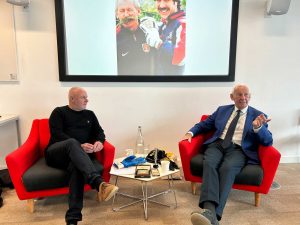Last Monday, the BU Business School and the Sport & Physical Activity Research Centre (SPARC) were delighted to welcome Mr Bob Wilson, OBE, for a special session.
Launching the annual ‘SPARC Audience with ….’ Series, this inaugural event explored the multiple careers of Bob Wilson: a former Arsenal and Scotland goalkeeper, a presenter and broadcaster, the first ever specialist goalkeeper coach, and founder of the national charity, The Willow Foundation.

Professor Mike Silk in conversation with Bob Wilson OBE
During An Audience with Bob Wilson, Bob touched on a multitude of topics that are germane to the BU community, covering topics that included the sport media, the life of a professional athlete, (national) identity politics in sport, the development of the women’s game, football as ‘work’, injury, the commercial spectacle of the modern game, and some of the broadcast personalities with whom he has worked.
Bob regaled the audience with stories from his early playing days explaining how his Father refused to let him join Manchester United, insisting instead he completed teacher training at Loughborough College so he could hold down a ‘proper job’. We celebrated some of Bob’s accomplishments, including being an ever present in the 1970/71 double winning season, with Bob sharing his winning medals from both the League and FA Cup final and his international caps. He spoke about the ways in which he was treated by the Scottish press when—as an Englishman—he was picked to represent the Scottish national team. He spoke of losing his older brothers in the second World War and how his family reacted to Bob idolising the playing style of ex-German soldier and Manchester City Goalkeeper, Bert Trautman.
In addition to appreciating his football career, we spoke about how he transitioned to a career in the media—going on to present programmes such as Grandstand, Match of the Day, BBC Breakfast and Sportsnight on the BBC as well as League Cup, FA Cup, UEFA Champions League and World Cup coverage on ITV. Bob gave fascinating insights into the creation of his own programme, Football Focus, as well as his unique ‘running’ reporting style from coverage of the London Marathon. We heard insights into the tensions and dynamics of live television when Bob told us how he and the production team dealt with being live on air on the Saturday afternoon of the 15th April, 1989 as he fronted Grandstand and bought the country to a standstill with coverage of the unfolding Hillsbrorough disaster.
Bob provided a unique lens into the development of the game of football. He was the first ever goalkeeper coach, staying on at Arsenal after his playing days—juggling coaching with his media career—providing coaching for the likes of Pat Jennings, John Lukic and David Seaman. This was a role he did for free until the arrival of Arsene Wenger as Arsenal Manager who insisted he be paid for his duties. Bob was, in many ways, the pioneer for the plethora of specialist coaches that exist today in the modern game.
Finally, we spoke of the incredible achievements of the Willow foundation, the charity he and his wife, Megs, set up in 1999 in memory of his daughter Anna who died from cancer at 31 years of age. The Willow Foundation—so named after his own football nickname, Willow—provides psychological and emotional support for seriously ill 16-40 year olds through the provision of special day experiences. Bob explained how, to date, the Willow Foundation has in 25 years supported over 22,000 families.
With some great questions from the audience, hilarious stories and insightful discussion, An Audience with Bob Wilson saw staff and students from across the institution engage with a sporting and broadcasting legend.













 UKCGE Recognised Research Supervision Programme: Deadline Approaching
UKCGE Recognised Research Supervision Programme: Deadline Approaching SPROUT: From Sustainable Research to Sustainable Research Lives
SPROUT: From Sustainable Research to Sustainable Research Lives BRIAN upgrade and new look
BRIAN upgrade and new look Seeing the fruits of your labour in Bangladesh
Seeing the fruits of your labour in Bangladesh Exploring Embodied Research: Body Map Storytelling Workshop & Research Seminar
Exploring Embodied Research: Body Map Storytelling Workshop & Research Seminar ECR Funding Open Call: Research Culture & Community Grant – Apply now
ECR Funding Open Call: Research Culture & Community Grant – Apply now ECR Funding Open Call: Research Culture & Community Grant – Application Deadline Friday 12 December
ECR Funding Open Call: Research Culture & Community Grant – Application Deadline Friday 12 December MSCA Postdoctoral Fellowships 2025 Call
MSCA Postdoctoral Fellowships 2025 Call ERC Advanced Grant 2025 Webinar
ERC Advanced Grant 2025 Webinar Update on UKRO services
Update on UKRO services European research project exploring use of ‘virtual twins’ to better manage metabolic associated fatty liver disease
European research project exploring use of ‘virtual twins’ to better manage metabolic associated fatty liver disease